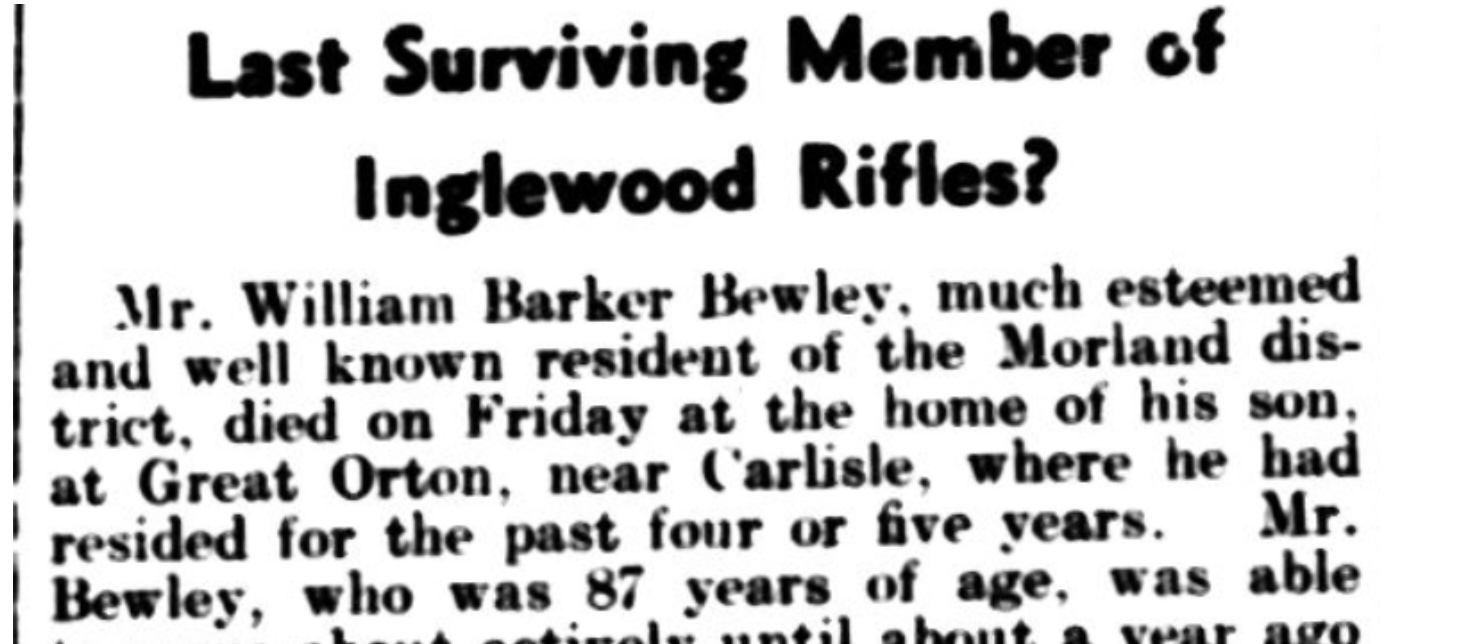In my post on the Inglewood Rifles I finished with a section called Last of the volunteers.
That reported that by 1926, only four of the original volunteer riflemen had died. And that the last of them, William Miller, died in 1932 at Salford, aged 89.
William Miller outlasted all the men sworn in when the Inglewood Rifles was set up in 1860.
But he wasn’t the last member of the Rifles to die – and that was a claim to fame that would feature in a number of obituaries after.
George Irving, of Penrith
A Penrith Observer article in 1936 refers to a statement that the late George Irving, who had died aged 81, was said to have been the last survivor of the Inglewood Rifles.
Looking into it, George Irving was an ironmonger, of Brunswick Square, who had joined the corps in 1872. He retired with the rank of sergeant and was awarded the Voluteers’ Long Service Medal.
Jonathan Thompson Chapelhow
Jonathan Thompson Chapelhow spent more than fifty years in the grocery business, both behind the counter and travelling.
His ‘claim to local fame’ was to have been:
‘one the very few surviving Penrithians who took part in the famous Wet Review of Volunteers by Queen Victoria at Edinburgh, in 1881’.
Born at Plumpton, a year after the formation of the Inglewood Rifles, he died in 1937, aged 75.
William Barker Bewley
William Barker Bewley died in April 1938, aged 87.
Born at Cliburn, he’d spent most of his life in and around Morland, where he worked as a ploughman, and then as gamekeeper on the Morland Hall estate.
His obituary says:
‘as a young man, he worked in Penrith and 67 years ago joined the old Inglewood Rifles, of which it is thought he may have bene the last survivor’.
That 67 years means he must have joined around 1871.
However, after his obituary appeared, ‘several old Penrithians’ came forward, still alive, who had had a connection with the corps.
Names mentioned were Tom Smith, Sep Sinkinson, J W Stephenson, James Bell, and Tom Tinkler, ‘to mention a few’. (Penrith Observer 12/4/1938))
With John Story – who in April 1938 was a month short of 88 years old – said he had served in the Inglewood Rifles ‘for six or seven years,’ till family and work commitments obliged him to quit.
John Story/John Story
John Story (or Storey), a cabinet maker by trade, had joined the corps in May 1868, attaining the rank of corporal.
His name, as a survivor, appears in a 1930 article along with those of William Waterson (retired tobacconist), George Richardson (retired joiner), and John Sharp (retired cabinet maker). Waterson had joined in 1870 and other others in 1872.
John Story/Storey died early in 1940.
Tom Smith
Tom Smith isn’t an easy name to research, but I did find a reference, in 1937, to a T Smith in a report on the 4th Battalion of the Border Regiment (Territorial Army):
‘in Mr T Smith, they had one of the original members of the old Inglewood Rifles’.
This was 77 years after the Rifles was founded, so unless Mr Smith was still active in his late 90s, he can’t have been close to being an original member.
The oldest Tom Smith on the 1939 register (if he lived in Penrith) was a grocer born in 1867. And he would have been 75 in the new report two years earlier.
Joseph Allison Moscrop
Joseph Allason Moscrop was only five when the Inglewood Rifles were signing their first recruits.
After spending his childhood and teens in Penrith, he moved around the country through his work as a customs officer.
His obituary says he joined the Inglewood Rifles in 1883 (he’d have been 18), and served continuously – seeing action in France in the First World War, in his 50s.
The Liverpool Evening Express says he reached the rank of sergeant-major by the end of war, starting his obit
‘probably the oldest member of the Liverpool Rifles (6th Kings)’.
Dig a little deeper and he was living in Wavertree, Liverpool, by 1901. And shows up as a customs office lodging in Ayr in 1891. So his service with the Inglewood Rifles can’t have been for more than a few years.
However, given that others like John Story made their ‘oldest survivior’ claims based on just a few years’ service, John Allason Moscrop maybe does take that crown. For he died in May 1950.
Footnote
I can’t find an exact date for when the Inglewood Rifles was absorbed into the Border Regiment’s TA battalion. The band was playing at a picnic in 1890. But by 1894, it was being referred to as ‘the old Inglewood Rifles’.
If the end of the unit was recorded, it doesn’t show up on a search of the BNA digital archive.
And yet clearly, it lived long in public memory, or stories about ‘last survivor’ in the 1930s would have meant little or nothing to readers.

